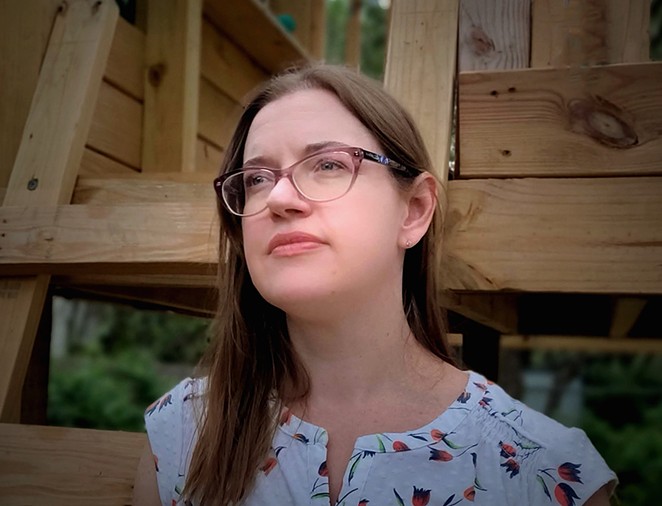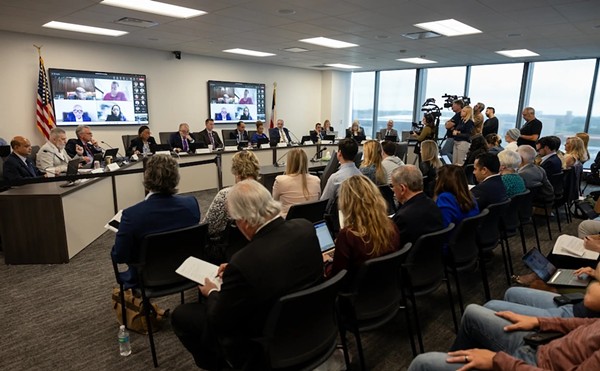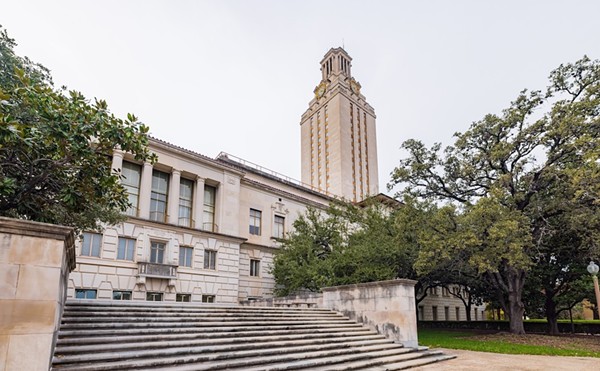Texas House Candidate Claire Barnett Believes Voters Deserve a Democratic Choice
By Jade Esteban Estrada on Fri, Oct 23, 2020 at 8:00 am
When Claire Barnett appears on my screen, the wall behind her is hard to miss. It’s bright blue, the color of the Democratic Party.
“That wasn’t a driving factor,” she says with a laugh when I ask if that’s why she picked the color. However, as the unopposed Democratic nominee for Texas House District 122, she admits that the choice was convenient.
For a second time, Barnett’s political rival is Lyle Larson, a moderate Republican and water expert who’s earned a reputation of working across the aisle during his five terms at the State Capitol.
Despite his good reviews, Barnett, 40, feels that constituents deserve a Democratic candidate on the ballot.
Before deciding to run in 2018, the Houston native came to a realization about her political purpose after sharing her initial concerns with her mother one day in her kitchen.
“Am I the right person to do this? I’ve never done this before,” Barnett told her mother. “My mom said, ‘Well, you know, Claire, sometimes we do hard things because we can ... and not everyone can.’”
Those words continue to echo in her mind, particularly when she’s having a rough day.
“For decades and centuries, Black Americans and immigrants, and Native Americans, who have so many talents, so much light to shine in the world, have not had that opportunity [to run for office],” she says. “We need to hear about them — from them. I certainly can’t speak to the experience of a Black woman or an immigrant, but we need those voices in our political system.”
As an advocate for education and healthcare, she garnered 38% of the vote in 2018.
Barnett’s interest in politics was sparked in college, when she lived in Argentina as part of a Latin American studies program during the height of that country’s Great Depression, which lasted from 1998 to 2002.
Though she studied Latin American literature and history, she focused largely on politics.
Barnett seems to have come full circle.
She sees a lesson about civil society when comparing Argentina of 20 years ago with what she describes as an “erosion” of our country’s strongest institutions. She says a certain degree of complacency is to blame. That, and the idea of American exceptionalism.
“We have this 200-year democracy that was a model for everyone else, like, ‘Nothing like [the Argentine Great Depression] can happen here!’ and then that [ideological] polarization that has just brought us to this point,” she says. “We’re not even living in the same realities anymore as our neighbors.”
I ask her why she cares.
“Because we’re all human?” she volunteers with a laugh. “I grew up in a family where it was part of our family culture that we were kind and we helped other people.”
In the ’80s and ’90s, her family openly discussed issues of race and economic privilege, she adds.
“I was always surrounded by people who were trying to do the right thing and believed that human goodness drives us all regardless of what church or synagogue, or temple, or mosque you go to, regardless of your race or language.”
In time, gender identity was added to the list.
“My family’s viewpoint on sexuality has evolved over time, and seeing the evolution in my own relatives about their perceptions of the LGBTQ community has been inspiring to me,” she says. “People aren’t stuck in what they were taught.”
Speaking of teaching, Barnett’s job as an instructional designer keeps her on the cutting edge of the distance-learning phenomenon.
I ask her to list the top three things that parents and teachers should keep in mind about online learning.
“I think the first most important thing is you cannot teach online like you do in person,” she says. “People’s attention spans are different online. What works when you’re in a classroom does not always work when you’re online.”
The second piece of advice is the old adage that less is sometimes more. While it’s possible to piece together mind-blowing side shows, they can be distracting if they don’t reinforce the point of the lesson.
Her third nugget is the importance of human connection and meeting people where they are, both literally and figuratively.
“We need to be careful about how we respect people being in their home and what [instructors] expect from them,” she explains. “When people are in their homes, [these] are usually their private spaces. Somebody could be embarrassed by what is going on in their home, or maybe there’s just a lot of people in the space and it’s chaotic. Kids will bully each other just about anything, so they’re going to see my house that doesn’t look as good as your house. These things are difficult to navigate.”
When I ask what advice she might offer for people in the district during these trying times, Barnett looks to the legacy of the late Justice Ruth Bader Ginsburg.
“She was a woman who never gave up,” she says. “As dark as these things seem and are now, we can’t give up. We need to keep marching on, and we need to vote like there’s no tomorrow, because we know it’s going to get ugly over the next several [weeks]. We all have to do what we can.”
She smiles, then says, “I’m not giving up.”
Stay on top of San Antonio news and views. Sign up for our Weekly Headlines Newsletter.
“That wasn’t a driving factor,” she says with a laugh when I ask if that’s why she picked the color. However, as the unopposed Democratic nominee for Texas House District 122, she admits that the choice was convenient.
For a second time, Barnett’s political rival is Lyle Larson, a moderate Republican and water expert who’s earned a reputation of working across the aisle during his five terms at the State Capitol.
Despite his good reviews, Barnett, 40, feels that constituents deserve a Democratic candidate on the ballot.
Before deciding to run in 2018, the Houston native came to a realization about her political purpose after sharing her initial concerns with her mother one day in her kitchen.
“Am I the right person to do this? I’ve never done this before,” Barnett told her mother. “My mom said, ‘Well, you know, Claire, sometimes we do hard things because we can ... and not everyone can.’”
Those words continue to echo in her mind, particularly when she’s having a rough day.
“For decades and centuries, Black Americans and immigrants, and Native Americans, who have so many talents, so much light to shine in the world, have not had that opportunity [to run for office],” she says. “We need to hear about them — from them. I certainly can’t speak to the experience of a Black woman or an immigrant, but we need those voices in our political system.”
As an advocate for education and healthcare, she garnered 38% of the vote in 2018.
Barnett’s interest in politics was sparked in college, when she lived in Argentina as part of a Latin American studies program during the height of that country’s Great Depression, which lasted from 1998 to 2002.
Though she studied Latin American literature and history, she focused largely on politics.
Barnett seems to have come full circle.
She sees a lesson about civil society when comparing Argentina of 20 years ago with what she describes as an “erosion” of our country’s strongest institutions. She says a certain degree of complacency is to blame. That, and the idea of American exceptionalism.
“We have this 200-year democracy that was a model for everyone else, like, ‘Nothing like [the Argentine Great Depression] can happen here!’ and then that [ideological] polarization that has just brought us to this point,” she says. “We’re not even living in the same realities anymore as our neighbors.”
I ask her why she cares.
“Because we’re all human?” she volunteers with a laugh. “I grew up in a family where it was part of our family culture that we were kind and we helped other people.”
In the ’80s and ’90s, her family openly discussed issues of race and economic privilege, she adds.
“I was always surrounded by people who were trying to do the right thing and believed that human goodness drives us all regardless of what church or synagogue, or temple, or mosque you go to, regardless of your race or language.”
In time, gender identity was added to the list.
“My family’s viewpoint on sexuality has evolved over time, and seeing the evolution in my own relatives about their perceptions of the LGBTQ community has been inspiring to me,” she says. “People aren’t stuck in what they were taught.”
Speaking of teaching, Barnett’s job as an instructional designer keeps her on the cutting edge of the distance-learning phenomenon.
I ask her to list the top three things that parents and teachers should keep in mind about online learning.
“I think the first most important thing is you cannot teach online like you do in person,” she says. “People’s attention spans are different online. What works when you’re in a classroom does not always work when you’re online.”
The second piece of advice is the old adage that less is sometimes more. While it’s possible to piece together mind-blowing side shows, they can be distracting if they don’t reinforce the point of the lesson.
Her third nugget is the importance of human connection and meeting people where they are, both literally and figuratively.
“We need to be careful about how we respect people being in their home and what [instructors] expect from them,” she explains. “When people are in their homes, [these] are usually their private spaces. Somebody could be embarrassed by what is going on in their home, or maybe there’s just a lot of people in the space and it’s chaotic. Kids will bully each other just about anything, so they’re going to see my house that doesn’t look as good as your house. These things are difficult to navigate.”
When I ask what advice she might offer for people in the district during these trying times, Barnett looks to the legacy of the late Justice Ruth Bader Ginsburg.
“She was a woman who never gave up,” she says. “As dark as these things seem and are now, we can’t give up. We need to keep marching on, and we need to vote like there’s no tomorrow, because we know it’s going to get ugly over the next several [weeks]. We all have to do what we can.”
She smiles, then says, “I’m not giving up.”
Stay on top of San Antonio news and views. Sign up for our Weekly Headlines Newsletter.
Tags:

KEEP SA CURRENT!
Since 1986, the SA Current has served as the free, independent voice of San Antonio, and we want to keep it that way.
Becoming an SA Current Supporter for as little as $5 a month allows us to continue offering readers access to our coverage of local news, food, nightlife, events, and culture with no paywalls.
Scroll to read more San Antonio News articles
Newsletters
Join SA Current Newsletters
Subscribe now to get the latest news delivered right to your inbox.


















